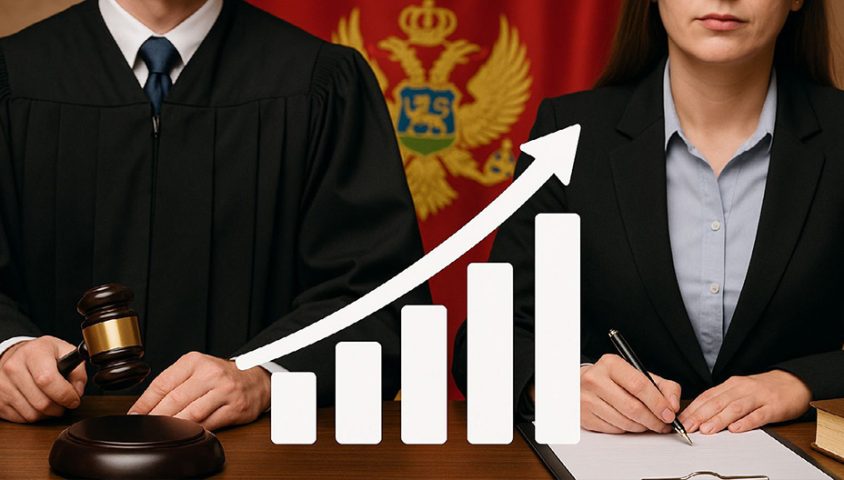
N7.T4 – Closing Chapter 23: What Else Does Montenegro Need to Do in the Area of Judiciary?
08/05/2025
N7.T6 – The Judicial Council Did Not Allow Judges from the Special Department of the High Court in Podgorica to “Escape”
08/05/2025N7.T5 – Salary Increase for Judges and State Prosecutors

HRA NEWSLETTER 7 – TOPIC 5
Judges and state prosecutors in Montenegro may soon see an increase in their salaries. The Government of Montenegro has proposed amendments to the Law on the Judicial Council and Judges and the Law on the State Prosecution, aiming to raise their salaries by 30%.
The proposed changes include a 30% function-based bonus for heads of prosecution offices, prosecutors, judges, and court presidents, in addition to their basic salaries. This bonus does not preclude the right to other salary-based benefits as stipulated by law.
In February, Valentina Pavličić, the President of the Supreme Court of Montenegro, called for an “urgent temporary solution” to enhance salaries within the judiciary. She addressed Prime Minister Milojko Spajić, Deputy Prime Minister Momo Koprivica, Minister of Justice Bojan Božović, and Minister of Finance Novica Vuković. Pavličić contended that Montenegro is obliged to enact a special law to adequately regulate judges’ salaries, similar to measures taken in Croatia, Serbia, and Bosnia and Herzegovina. As a temporary measure, she proposed adopting the Draft Law on Amendments to the Law on Salaries in the Public Sector, which would result in an approximate 30% salary increase for judges.
Last fall, the Association of Judges of Montenegro planned a warning strike in response to what they characterized as the Government’s negative attitude toward the judiciary and the unacceptably low judicial salaries. However, they abandoned the strike after negotiating with representatives from the Ministry of Justice and the Ministry of Finance.
Additionally, the Trade Union of State Prosecutors has expressed concerns regarding low wages, not only for administrative staff but also for prosecutors themselves.
“As a result, most prosecution offices in Montenegro are facing staffing shortages. This situation not only complicates daily operations but also significantly impacts the quality and efficiency of work. Current staff are overburdened due to the lack of new prosecutors, which could ultimately lead to dysfunction within the entire judicial system,” the union stated.
According to available data, salaries within Montenegro’s judiciary vary significantly. Basic salaries for lower-level judges range from €1,200 to €1,600, while Supreme Court judges earn between €2,500 and €3,000. In basic prosecution offices, the average salary is approximately €1,600, whereas higher prosecution offices average around €1,900. Special prosecutors earn about €2,500 on average, while the President of the Supreme Court and the Supreme State Prosecutor receive nearly €4,200 per month, including allowances.
HRA NEWSLETTER 7
- N7.T1 – Vesna Medenica Free to Travel Throughout Montenegro; Eight Judges Testify in Her Favor
- N7.T2 – Accountability of Judges and Prosecutors in Montenegro – A Rare Occurrence
- N7.T3 – Vetting in Moldova – Three Candidates Rejected in March
- N7.T4 – Closing Chapter 23: What Else Does Montenegro Need to Do in the Area of Judiciary?
- N7.T5 – Salary Increase for Judges and State Prosecutors
- N7.T6 – The Judicial Council Did Not Allow Judges from the Special Department of the High Court in Podgorica to “Escape”
- N7.T7 – Tensions Between the Constitutional Court and the Supreme Court: A Joint Meeting as a Possible Solution
- N7.T8 – Human Rights Action Participates in Meeting with Venice Commission
- N7.BN – BRIEF NEWS






 English
English